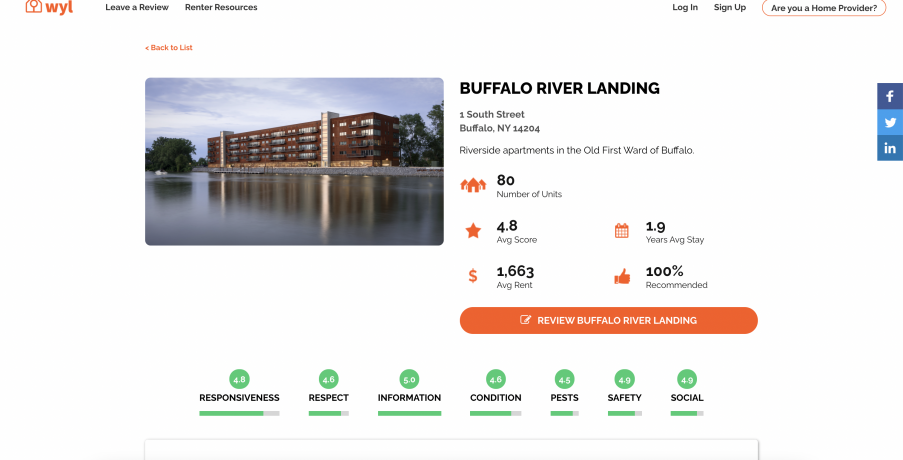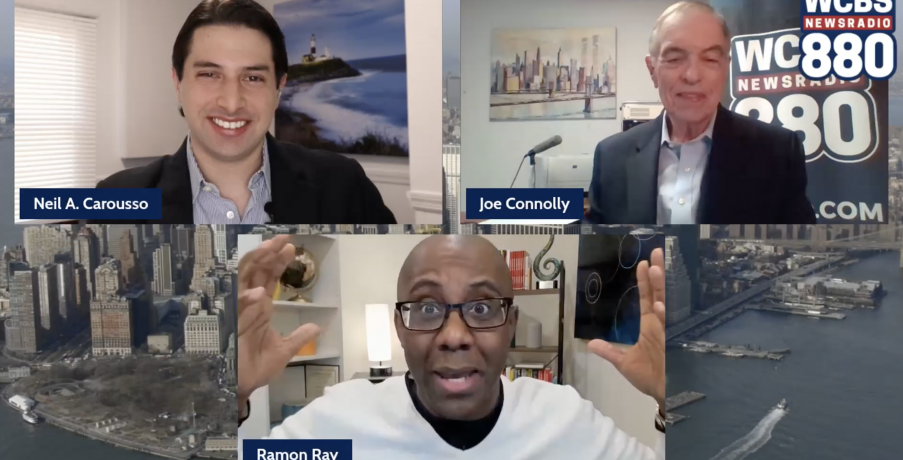
-
Whose Your Landlord Introduces Transparency, Accountability to Residential Rental Market
Post Views: 590By Joe Connolly and Neil A. Carousso
NEW YORK (WCBS 880) — This business is redefining the landlord-tenant relationship.
While studying entrepreneurship, management and information systems at Temple University, Ofo Ezeugwu saw first-hand that the trust between landlords and tenants was broken. He thought there had to be a better system, and in 2015, he founded Whose Your Landlord.
“Housing started coming up a lot as we were talking to students,” he explained to Joe Connolly and Neil A. Carousso on the WCBS Small Business Spotlight, sponsored by Dime Community Bank.
“There was (sic) so many issues around infestation or harassment between male landlords and female residents,” Ezeugwu said. “Things that, you know, quite honestly, no one should go through.”
As a first-generation American whose mother is from Barbados and father is from Nigeria, he was motivated to make an impact and solve a glaring problem in the residential rental market.
“At first, I thought there had to be some way just to review landlords so you knew what to expect before signing your lease. And honestly, as we built that out, there was (sic) so many other value-adds that having that insight be more prevalent in this industry,” said Ezeugwu.
Whose Your Landlord launched in New York and Pennsylvania where he was attending school at Temple. Today, it is available in 400 cities with 25,000 different landlords and property managers reviewed on the platform.
Tenants share their experiences in an apartment building, which informs others looking to rent. Reviews are vetted so it is appropriately mixed between positive and negative, and topics range from the landlord-tenant relationship to living conditions.
“We see ourselves as being the number one used platform when it comes to resident reviews and analyzing resident insights for home providers,” Ezeugwu said, adding, “We also see ourselves really shifting that culture, that relationship between residents and home providers, forever.”
This year’s Forbes 30 Under 30 winner for social impact told WCBS 880 he has observed rental conditions improving in Charleston, SC, Dallas and Houston, TX.
“I think if we can kind of recreate how we think about our industry as a collective, it’s only going to lead to more positivity.”
He said landlords benefit, too, from data that helps them provide better service and grow their real estate businesses.
“They’re actively asking, ‘We want feedback. We want insights. Please share that with us,'” said Ezeugwu.
Some of the analytics Whose Your Landlord collects and provides property owners for a fee, include complaint trends from appliances being out of service to snow and ice removal.
The company also sells advertisements on its website to major brands who can further serve tenants.
“So if you are Allstate, you know, renters insurance is huge and it’s actually pretty cheap comparatively to other insurances. So, why not protect your apartment and your car if people don’t usually often realize your car gets broken into that covers it, too?” said Ezeugwu of one brand partnership.
“We would create content like that that helps support renters,” he said. “It was always adjacent to their experiences so that it would be more valuable to them as a(n) overall platform.”
See more about Whose Your Landlord and get growth ideas for your business on the WCBS Small Business Spotlight video above.
-
The Cost of Inflation: Consumers Face Higher Prices for Food, Household Items
Post Views: 682Produced by Neil A. Carousso
NEW YORK (WCBS 880) — American consumers are facing the brunt of inflation.
Prices for food, cars, and household furniture and appliances are responsible for much of the 7.5 percent annualized inflationary surge. Wage pressures resulting from the tight labor market could push inflation higher, too, as WCBS anchor Steve Scott discusses with CNBC senior economic reporter Steve Liesman on The 880 Weekly Rewind.
-
How to Create ‘FOMO’ in Virtual Events to Grow Sales
Post Views: 520By Joe Connolly and Neil A. Carousso
NEW YORK (WCBS 880) — No one wants to feel left out.
Some businesses have been thriving in the digital space and using virtual events to drive sales. While virtual events allow companies to reach audiences outside their normal radius, combating Zoom fatigue can be the biggest barrier.
VeeKast president and CEO Donvil Collins’ advice: “Find some way to give your viewers 10 seconds of fame.”
He told Joe Connolly and Neil A. Carousso on the WCBS Small Business Spotlight, sponsored by Dime Community Bank, that people on the other end of the computer need to feel like they are part of an experience. It won’t be successful if it’s one-way communication.
“Especially thinking about the chat, can people respond? Are people in the broadcast able to respond to the people that are watching?”
One of VeeKast’s clients, Collins said, had been drawing about 400 people for in-person events pre-pandemic. It had a live audience of 2,000 people online and they got more than 6,000 views of its event on-demand.
“Really part of what they did was creating what I like to call ‘FOMO,'” he said of the acronym that stands for “Fear of missing out.”
“That’s one of the big things that organizations are missing sometimes and not only getting people to watch it live and not feel like they’re just watching, they’re actually a part of this event. It’s not a production, it’s an event,” Collins explained, continuing, “And then for the replay, it’s ‘What did you miss? What’s the big deal?’ So I think FOMO is a big part of driving engagement, views, and all of that.”
VeeKast was founded in 2013 as an in-person events and video production company based in White Plains, NY. Collins made commercials and other advertising while also producing some livestreaming events. By focusing on virtual events during the pandemic, Collins said they doubled their business both in 2020 and 2021 from the year prior.
“Our goal for this year is we’re just going to push it and try to triple the business,” he said. “At least from what we’re seeing in an increase, there’s a lot of opportunity there because there’s so much need for help. People want to get this stuff done, but they don’t really know how, and they just need a single mind or a managerial company or someone that can come in with all the gear and actually help them do it well.”
VeeKast prides itself on producing virtual events that look like the Academy Awards with overlay designs and professional audio/video equipment they supply as part of a “remote broadcast kit.”
“We send a lavalier mic, we also send tripods and we send them a link that we can control the camera equipment remotely,” said Collins.
“From your offices in Westchester, you’re running a whole TV network like a control room now,” noted Connolly.
“There’s some that was (sic) international locations in Europe and other places and we are controlling the gear that is there so we can get the quality of the recording to be better.”
See ways businesses are leveraging broadcast quality virtual events to grow sales on the WCBS Small Business Spotlight video above.
-
880 Weekly Rewind: Crime Shakes NYC, Americans Die from COVID at Higher Rates than Europeans, Tiki Barber Gets Emotional Over Brian Flores Lawsuit
Post Views: 411Produced by Neil A. Carousso
NEW YORK (WCBS 880) — The mayor is calling for help.
https://omny.fm/shows/880-weekly-rewind/crime-shakes-nyc-americans-die-from-covid-at-higheOn The 880 Weekly Rewind, Mayor Eric Adams explains what he needs from President Joe Biden and the federal government to get New York City’s crime surge under control.
Lynda Lopez also explores why U.S. COVID-19 death rates are far higher than other wealthy nations, and takes a hard look at Brian Flores’ lawsuit against the NFL with retired New York Giants running back Tiki Barber of WFAN.
Listen to The 880 Weekly Rewind podcast for a deep dive into the top stories of the week, produced by Neil A. Carousso for WCBS-AM New York.
-
Taking the Leap: Growing and Scaling a Business Amid Great Resignation
Post Views: 621By Joe Connolly and Neil A. Carousso
NEW YORK (WCBS 880) — Many people who started businesses while working from home are quitting their jobs to run their companies full-time.
“I love the independence of entrepreneurship,” said Ramon Ray, founder of Smart Hustle Media, on the WCBS Small Business Spotlight, sponsored by Dime Community Bank.
Ray has made a career out of his passion for small businesses, advocating for digital growth tools and community support. During the COVID-19 pandemic, the serial entrepreneur saw so-called “solo-preneurship” booming and wrote an e-book guide “Grow Your Solo” in which Ray outlines steps to start and grow a sole-proprietorship.
“You can scale the business to the size that you want and be happy with that and live the life you want,” he told WCBS 880.
A record 5.4 million Americans submitted new business applications in 2021, a number that has accelerated since July 2020 as economists and employers became aware of the great resignation phenomenon.
One of the greatest challenges new business owners face is pricing their products and services.
“Let’s say in the Northeast, right – us people – you want to pay yourself $150 (thousand), $200 (thousand), whatever it is,” Ray said. “Now, maybe triple that.”
The small business expert noted owners have to pay employees and contractors, overhead costs, operating expenses, other unforeseen costs, plus taxes. That’s a big adjustment for entrepreneurs who have left high-paying salaried jobs.
Ray started Smart Hustle while working at the United Nations. He told Joe Connolly and Neil A. Carousso that he was fired about seven years ago with one client on his roster.
“I had a $40,000 client. That’s all I had, Joe, but it was able to give me enough cushion and a starting point, a runway, to begin my full-time business,” said Ray.
He accepted monthly payments from the client to stay afloat and support his family while selling his services to more clients.
He suggests owners secure a few good clients, first, before taking the leap. At the same time, he believes entrepreneurs who are confident in their business will succeed if they are passionate and motivated.
As a small business owner himself, Ray consults with large national and international firms as clients and is the entrepreneur-in-residence at NetSuite, Inc., a leading cloud computing software company.
“If you’re trying to bid or sell for a larger project, don’t try to pretend and say, ‘We, we, we. We have 100 people back there,’ when you don’t. They’ll smell through that, so you can’t sell on that,” he explained, adding, “But, you can sell them on the passion and commitment and your, hopefully, past success and talk about, ‘We’re small, but we’re nimble. Maybe we can be more price competitive. We have an amazing team that will serve your needs and we will be your only focus.'”
Ray also advises to sell services directly to an executive within a company because that person can be a key endorsement and referral to other departments within the firm.
See more advice and inspiration for starting, growing and scaling a business on the WCBS Small Business Spotlight video above.
News Stories
Social Feeds

VIDEO: Told the airline to book us on the next flight out (SPONTANEOUS TRIP!)

VIDEO: The Taylor Swift Effect | WCBS Business Breakfast

VIDEO: Future of NYC | WCBS Business Breakfast

VIDEO: Reasons for New Yorkers to be Optimistic | WCBS Business Breakfast

VIDEO: NYC's AI Chatbot | WCBS Business Breakfast






